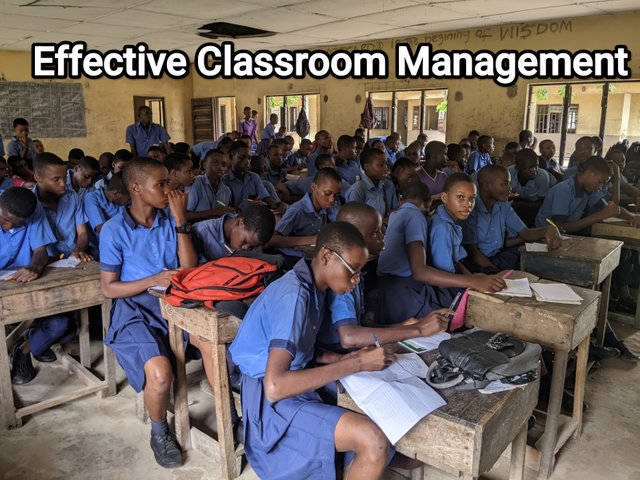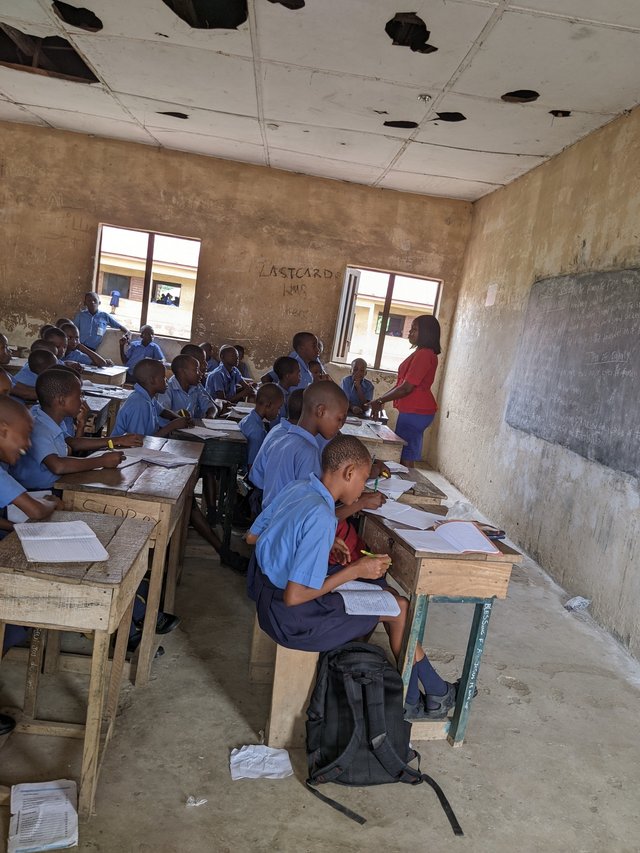
Imagine walking into the classroom as a teacher, and the class is rowdy. The students in that class are much and are making a hell of noise. You enter the classroom, but your presence is not noticed. You need to do something to manage your classroom and reduce the noise. Most Nigerian teachers use cane or their authoritative voice to manage their classroom. In such a situation whereby the noise in your class keeps growing even when you're teaching, you need to create a striking balance between discipline and freedom.
The way you manage your class creates learning contracts and enhances the learning environment. In a class or 80, your voice is not loud enough, students ridicule you, there's a serious uproar that makes learning very uncomfortable, and you're disrespected because you're not in control. The students feel you're like them because you lack what we call classroom management.
Managing a class is like managing a business. If you don't manage your business properly, you would run losses. The gains would be short-lived; you'll get disrespected by your clients, and eventually, the business will collapse. Same with the classroom.

That's when class management comes into play to enhance learning experiences in the classroom. What is classroom management, and how is it attained? What factors contribute to a lack of classroom management? The answers would be discussed in the course of this post.
To the best of your knowledge, what is effective classroom management, and what does it have to do with planning, implementing, evaluating learning, and utilising resources optimally? Explain the relationship between each of these points using your language |
|---|
Classroom management is actually a process whereby teachers, mentors, and educators create a balanced and effective learning environment they are teaching. They manage their classroom in teaching, student factor, teacher factor, and environmental factors to ensure that learning runs smoothly and is enhanced, which creates good learning experiences among students.
I'll make this self-explanatory by giving instances of classroom management for better understanding of the topic.

Let's assume you're a teacher. You need to set rules in your class to guide the behaviour of students in the classroom as to how they should behave. I know of a teacher who told her students to speak only when they were called upon to speak. You can set classroom rules and principles like I don't like chorus answers.
If you want to answer a question, raise your hands. Rules like this would prevent students from making the class rowdy due to trying to give chorus answers. Class management is defined here. You just managed your class in a way that your rules are defined.
- Another instance is commending excellent students and those who try their best to answer questions in the class. An instance whereby you don't just focus on those that are smarter but also encourage active participation in class by the slow learners, you create an environment they can focus instead of feeling the lecture or class is just for intelligent people and not for them.
This is what we call classroom management. When you're able to connect with all students in your class, it makes them feel you're interested in them as an individual. Learning experiences are enhanced, and there's more focus than when such isn't done.

- Being in control of your class and informative on consequences for actions done. A teacher can enforce discipline on the misbehaviour of her students to avoid the feeling that she's condoning such. You as a teacher must feel in charge of your class as the boss and then warn your students of a consequence before taking actions that may inflict pain. So I'll be breaking this down into segments as to how classroom management helps **planning, evaluation etc.). Starting with planning, classroom management helps a teacher plan her delivery. How?
Planning, Implementation, Evaluation and Utilisation of resources
- Planning is very important or essential when it comes to classroom management. He who fails to plan is planning to fail. Planning is very essential as to what you can do in running a smooth class that's organised and free from noise. This planning may include discipline for those who act unseriously, strategies to make your class a lively one, and how to coordinate the class and keep it super active. These are planning schemes. It's just like going to an exam hall without reading areas where questions may come from or may not. Reading both sides keeps you firm in such a way that you can handle any question that comes your way.
Let's take this scenario of you teaching a science class and you want to carry out an experiment in the laboratory. Such activity produces noise and disorganisation. As a teacher, you'll plan how to bring about coordination in the lab, how to manage students movement and use of materials, and set rules and standards to avoid accidents. Proper planning helps the teacher maintain a level of balance and order in his or her class.
- Implementing: As a teacher, implementing management strategies like enforcing rules, daily routines, etc. into constant practice would help you manage your class. You don't necessarily need to be authoritative in your rules. Just establish that environment whereby the class is not lawless and that students don't do things they feel should be done the way the like. You need to also create that environment whereby you set boundaries, not smiling too much with the students or being overly playful with them. Let's take this scenario.
Let's say you're teaching chemistry in a class and you introduce a rule that before answering questions, you must raise your hands up instead of saying Aunt I or Uncle I to disrupt the class or giving chorus answers. The students will know that's your principle, and they'll surely abide by that. When this is constantly practiced and reinforced by the teacher, the students become fully aware of the rule and become even more attentive in class so as to answer questions in the interactive class.
- Evaluation: Evaluation matters a lot in class management. When evaluating students in your class, avoid calling only on those intelligent ones. Give room for others in the class to answer, and if they give wrong answers, don't scold them or call them blockheads, which is common among some teachers. Commend them for trying and encourage them to be more attentive next time. This won't create an atmosphere where people would shy away from commenting in class as you're being overly negative. This helps maintain the peace in the classroom and avoid extreme laughter and disorganisation. Let's take a scenario.
Let's say the class is doing a public reading comprehension, which everyone in class knows is a quiet time to hear the reader. The teacher makes an announcement that at the end of the comprehension, she would ask everyone in class questions to determine if they were following or not. If they don't, you will discipline them. This would make the students even more attentive and focus on what is being read to answer the questions. At the end of the reading, the teacher asks one-on-one questions to know where a student needs support.
- Utilizing Resources: The use of learning and instructional materials makes a class lively and interactive. The use of instructional resources to enhance understanding will make students interested in what you're teaching and not viewing the subject as something abstract or difficult to understand. The use of these materials prevents unnecessary disruptions as to not understanding, maximises instructional time, and improves learning experiences. This helps create effective classroom management by the teacher involved.
Most people feel classroom management is all about enforcing discipline and being in control, but that's far from it. It's not just about that but also about being organised as a teacher first before organising or managing your class. This organisation includes your preparation, learning strategies, response to factors that hinder classroom management, and your appearance as well.
Classroom Management is creating a suitable learning environment to enhance learning experiences
How do you go about creating a classroom atmosphere that supports the learning process?, he explanation you give is based on personal experience that did. |
|---|
The case is that of students in a public school where desks are not sufficient, students stand or squeeze themselves to learn. The school needs to work on this. I donated 50 steems to support them.
The question is specific and directional as to the experience I had as a teacher. I'll narrate it in detail. During my IT project, I was posted to a public school in a far place where I could teach students in SS2. I was afraid at first because public schools in Nigeria are actually known for accommodating students of any age, and it's usually a free school for the public.
The information I received about how rough schools like that, especially higher classes, scared me from going there, but on a second thought, I'm a teacher, and teachers aren't afraid to teach students irrespective of their age. My fear was if they'd listen to me because I'm small and I would be facing people that have broad and stronger looks. The news that students do best teachers in public schools also scared me, but that was short-lived. I overcame it and went to where I was posted.

When I was shown the class I was teaching and the turnout of students to some teachers there, I thought of strategies to teach without having a rowdy class and getting disrespected at the same time. When the chemistry teacher entered the class to teach and also introduce me, the students were carefree, not minding if a teacher was in class. Even during class, there was diverted attention from people who tend to create an association while in class.

Market women, sleepers, backbenchers, etc. All these people contributed massively to the noise in the classroom, but the teacher didn't give a damn. In her mind, she was like; The noise doesn't affect her as she's getting her salary. I interceded to calm the class, having thought of a friendly but disciplined strategy. I was behind and monitored every activity. I then made moves by changing the seats of those who were disturbing to the front seats and also used a cane as an authority.

The class was calm. After she left, I vibed a little with them and made them see me as someone approachable. I didn't make it seem my aim was just to discipline them. I created a friendly bond with the students to the point that they loved me and always looked forward to my class. How did I create this atmosphere that supports learning and learning experiences?
- Being in control: When you smile too much with students, they override that privilege, and when you're just calm with them, you give them an opportunity to disrupt the class. So you have to make them realise you're in control. Let them know there's a teacher in the class and that decorum is needed throughout the class unless called upon to speak.


Using my voice didn't help create this authority. I held a cane and threatened to use it on those who disturbed the class. With that, I gained control of the whole class, and they feared being punished.
- Reward learning: In a class of 120, I wasn't too strict with the students. I created an avenue where they would interact with me, and I interacted with them in a friendly way. I made my class lively by giving rewards to those who answered my question. I can remember telling the whole class that if they answered my question at the end of the class, I'll sponsor their lunch.
You needed to see the way these students paid attention so they wouldn't miss any detail. My aim was to enhance reading and learning among the students, as they have this lackadaisical attitude towards learning. They barely copy notes in class.
 |  |
|---|

So I used the rewards I get when posting diary games to reward serious students and also encourage those I can't reward to do better next time and that it would reach everyone. There was a time I bought exercise books for them, as that was a major challenge. This reward was to motivate learning and active participation in class while still trying to manage the class.
- Not everyone would learn in the same space, and you can't make that possible. Boring classes make students lose interest and focus in the class, and it creates a noisy environment. Classroom management isn't just about disciplining or being too authoritative; you have to look at ways to improve your teaching strategies to enhance learning and active participation in class.

- Personal interest in those students was paramount. I didn't focus on the intelligent students alone. I tried reaching out to those who found it difficult to flow fast. This will make them feel included and not left out, thus creating room for focus and active participation. Those who tend to disturb in my class have their seats changed to avoid spreading the noise or distracting others in the classroom

In summary, I was able to manage my class and make learning interesting by being in control of my class, using effective learning strategies to improve my teaching, not being overly authoritative and unfriendly, **getting to know your students better, and imbibing reward learning if necessary.
According to your experience and observations, what factors can hinder effective classroom management? Explain why these things are a hindrance. |
|---|
There are a lot of factors that hinder effective classroom management, which are:
Class size
Ineffective teaching strategies by teachers
Learning Environment [Environmental Factors]
Lack of preparation
Lack of engagement
Class size: This is an integral factor that affects management in a classroom by a teacher because a classroom that has about 100 students or more is likely to produce noise as it's not possible to reach out to everyone in class, especially those seated behind me. It's possible to control a class of 20 students, as you can see the faces of almost everyone in the classroom since the number of students is few, and this is mostly seen in private schools, while public schools are known for large class sizes of over 150 students in a long hall.

In such a situation, one may find it difficult to manage the class conveniently. He may be able to reduce the noise but won't stop disturbance at the back of the class. It's also difficult to carry everyone along in such a class.
To enhance learning in such a class, you can choose group learning or the project method, as it may not be that easy to reach out to everyone in the class, creating room for lack of interest and bad learning experiences.
- Environmental Factors: This is in fact the most important factor that hinders classroom management. If the learning environment is overly noisy or situated in places that breed entertainment, church programs, and the like, managing the class won't be that possible because the class's attention is diverted and the students would definitely lose focus, as learning is not that possible in a rowdy environment.
- Lack of engagement breeds noise and lack of focus because when a class is too dull or boring, students become less interested in learning and may even leave the class or rather disturb those that are focusing or paying attention. When a class is lively and there's active participation through questions and jokes, learning is enhanced, and students become more interested to focus on what's being taught.

- Lack of preparation by the teacher exposes him or her to being laughed at or mocked by the students, causing disorganisation among students. They'll feel you're not qualified to teach them if they are the ones correcting you in certain areas as you didn't prepare. It makes the class even more rowdy and difficult to manage.

- Appearance [Dressing and Grooming] matters: The way you dress will tell if the class will stumble or not. If a woman is wearing tight-fitting clothing, revealing her backside, it may cause distraction in the class, and even though you tend to be in control, background gossip would be heard. The class won't be organised, and you may end up disciplining the students for being too noisy, not knowing you're stumbling them.

- Condoning Misbehaviour: When you condone misbehaviour and fail to apply discipline consistently when necessary, students would feel you're weak and may want to test you and see. They'll feel that since you don't enforce rules and discipline, they can go about doing whatever they like.
Other factors include; Negative attitude of a teacher, parental involvement, language barriers, etc. Considering these factors and tackling them squarely will help you manage your class.
When observing classroom management by teachers in the school I was posted to, I observed that teachers teach without minding if the students in class are following or not. **All they tackle is their time.
The teacher teaches when some students are sleeping, not paying attention, or dividing the class, forming another class. I also observed that there was no active participation among students except for some teachers. This probably made learning so dull and uninteresting.
Effective classroom management has a relationship with the Learning Contract? What do you think about this, explain comprehensively according to your thoughts |
|---|
This relationship is more like a classroom setting where students know what is expected of them, feel responsible, and engage in learning because they want to succeed in life, not because of being forced to do something.
When you combine class management with learning contracts, you can achieve this. Learning contracts, as discussed last week, are a formal or informal agreement made at the beginning of a lesson where tasks are given and expected to be achieved, how students are expected to learn, and what they are expected to learn.
Goals are set to hit that agreement made. Class management, as mentioned earlier, is a practice by a teacher to maintain balance, organisation, and smooth running of the class in which he or she is operating. In this class, he is in control and sets the rules of the class to maintain decorum and discipline among students.
| Learning contracts | Agreement on what students are expected to do |
|---|---|
| Class management | Maintaining order in your class |
The relationship between these two is that both involve aspects of enhancing learning experiences and motivating students. How? Let's look at learning contracts as expectations from the teachers to students to make them responsible. It can be checked for cleanliness, assignments, and checking for noise makers.
These are ways in which we can say for sure that there's a relationship between learning contracts and classroom management.
A teacher might include a task in the learning contract that students need to submit their homework on Monday next week. Now once this is included and the students are aware of the tasks, class management practice comes it to prevent last-minute rush to submit as students would be more committed to avoid being punished.
- Classroom management helps students take responsibility for their actions, which they are more likely to avoid when they see there would be severe infliction of pain. Same with learning contracts that help students set and achieve goals they agree to achieve, which in fact brings about responsibility and accountability.
- A suitable learning environment is very essential for both learning contracts and classroom management, as it's a major determinant of how students would respond and how to avoid scenes whereby the environment is faulty. Creating this structured environment makes students feel focused and organised to follow the structure of information given out by the teacher. This is when both come into play.

To illustrate this, the learning contract has it that students must conduct lab experiments by the end of each week to enhance their understanding. Classroom management is when you're able to maintain the order during such experiments and also ensure it's done regularly to make students prepared.
- Motivation creation is very essential in both, as classroom management isn't just about enforcing discipline, the same with learning contracts, not just about agreeing to do.
In all, I would say that learning contract brings about Classroom management. To manage a class properly, you don't just need to be authoritative but also need to see areas you can improve in yourself, observations and environmental factors which all contributes to learning.
As an educationist, I'm expected to write in a way that gives me an A in exams. That's why this post is lengthy.
I invite @whizzbro4eva, @nsijoro and @basil20
@tipu curate
Downvoting a post can decrease pending rewards and make it less visible. Common reasons:
Submit
Upvoted 👌 (Mana: 6/8) Get profit votes with @tipU :)
Downvoting a post can decrease pending rewards and make it less visible. Common reasons:
Submit
You are right, classroom management is the process by which teachers, counselors, and educators create effective learning environments in which they teach. Good luck to you.
Downvoting a post can decrease pending rewards and make it less visible. Common reasons:
Submit